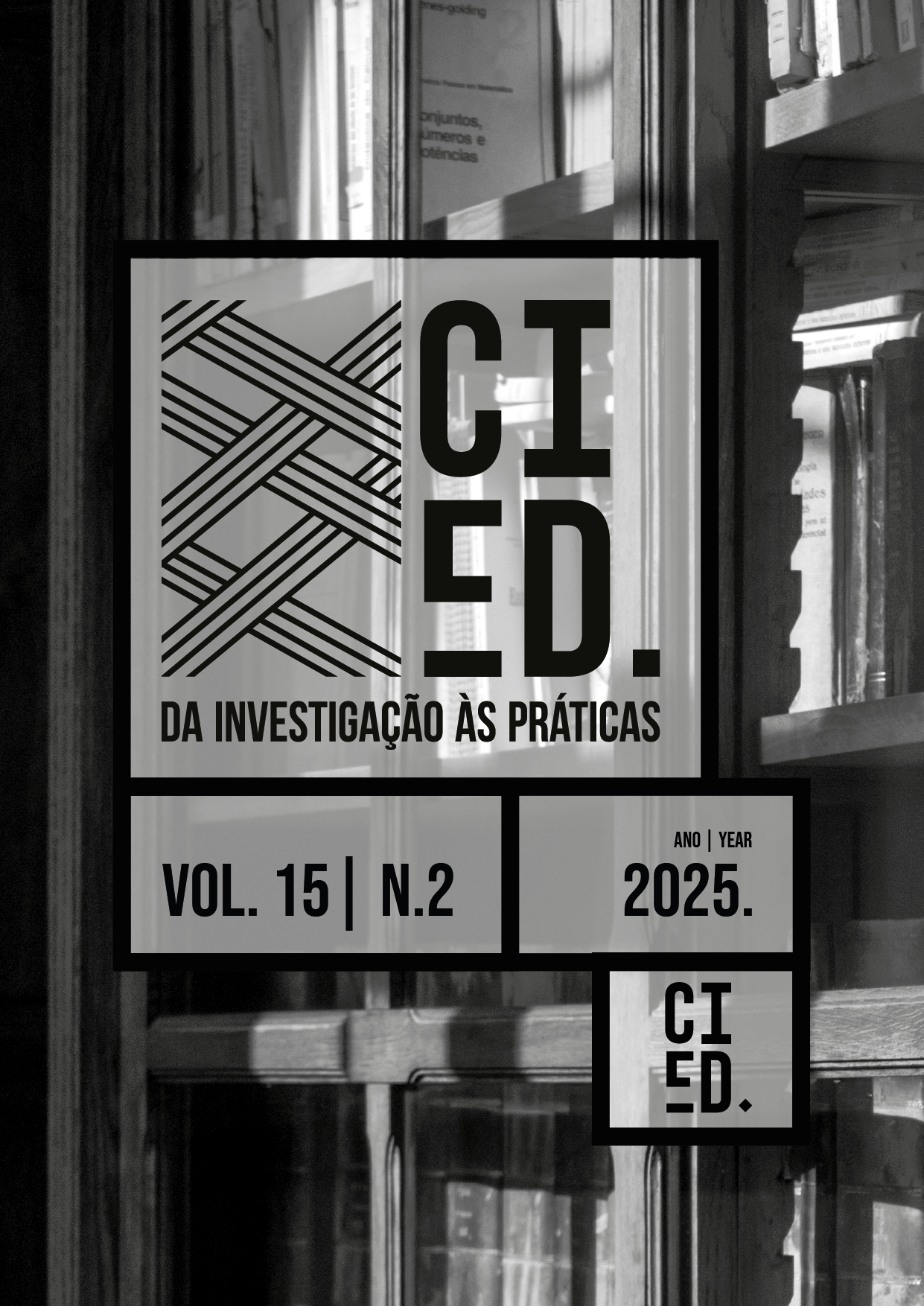Aprendizagem autoregulada e o uso de plataformas virtuais em estudantes universitários
DOI:
https://doi.org/10.25757/invep.v15i2.438Keywords:
Self-regulatede learning, Higher education, Virtual plataformsAbstract
This article seeks to explore self-regulatory competences in learning using virtual platforms in university students. In the context of the COVID-19 pandemic, an Online Self-Regulated Learning Questionnaire (OSLQ), Portuguese version validated by (Pavesi, 2013), was applied online. A total of 482 students from the Licungo-Mozambique University participated in the study, 306 (63.5%) male and 176 (36.5%) female. The data were analyzed using SPSS-version 23. Descriptive analysis was performed to characterize the participants and inferential analysis, based on the Chi-square test and the Student's t-test to assess the differences in the use of learning platforms and the self-regulation of students as a function of the variables age, family position and occupation. The results show that university students who are heads of household exhibited higher self-regulated learning scores in the dimensions task strategies, help-seeking, and overall self-regulated learning than dependent students. Finally, students and full-time workers scored higher on self-regulation in task strategies, help-seeking, goal-setting, and overall self-regulation. These results alert to the need to design and implement programs to promote self-regulation in learning in university students.
Downloads
References
Almeida, L. S., & Soares, A. P. (2004). Os estudantes universitários: Sucesso escolar e desenvolvimento psicossocial. In E. Mercuri & S. A. J. Polydoro (Orgs.), Estudante universitário: Características e experiências de formação (pp. 15-40). Taubaté, SP: Cabral Editora.
Bacan, A.R., Martins, G. H., Santos, A. A. A. (2020). Adaptação, estratégias e motivação na EAD. Psicologia: Ciência e Profissão, 40,1-15. Doi: http://doi.org/10.1590/1982-3703003211509
Barros, D. M. V. (2008). A teoria dos estilos de aprendizagem: convergências com as tecnologias digitais. Revista SER: Saber, Educação e Reflexão, 1(2), 14-28.
Cani, J. B., Sandrni, E. G. C., Soares, G. M., & Scalzer, K. (2020). Educação e COVID-19: a arte de reinventar a escola mediando a aprendizagem “prioritariamente” pelas TDIC. Revista Ifes Ciência, 6 (1), 23-39. DOI: 10.36524/ric.v6i1.713
Chickering, A. W., & Reisser, L. (1993). Education and identity. San Franscisco: JosseyBass.
Chitungo, H. H. C. (2021). Plataformas online para a mediação remota no ensino superior público angolano em tempos de COVID-19. Revista de Educação, Ciência e Tecnologia, 10 (1), 1-21
Cunha, L. F. F., Silva, A. S., Silva, A. P. (2020). O ensino remoto no Brasil em tempos de pandemia: diálogos acerca da qualidade e do direito e acesso à educação. Revista Com Censo: Estudos Educacionais do Distrito Federal, 7 (3), 27-37. Disponível em: http://www.periodicos.se.df.gov.br/índex.php/comcenso/article/view/924
Dornelas, M. A., De Campos., & Martins, V.L. (2020). Ensino remoto na pandemia: proposta de design instrucional a partir de estilos de aprendizagem. Brazilian Journal of Policy and Development, 2 (4), 118 -144.
Fistarol, C. F. S., Silveira, E. L., & Fischer, L. S. (2021). COVID-19 e uso de plataformas digitais: reverberações da sala de aula do espaço físico para o virtual. Revista Entre Línguas, 7, e021001.DOI: https://doi.org/10.29051/el.v7i00.15158
Ganda, D.R., & Boruchovitvh, E. (2018). A autorregulação da aprendizagem: principais conceitos e modelos teóricos. Revista Psicologia da Educação, 46, 71 -80. DOI:10.5935/2175-3520.20180008
Gusso, H. L., et al. (2020). Ensino superior em tempos de pandemia: diretrizes à gestão universitária. Educação e Sociedade, 41, 1-26. Doi: https://doi.org/10.1590/ES.238957
Huang, X., Chandra, A., & DePaolo, C.A. (2016). Undesrstandig transactional distance in web-based learning environments: Na empirical study. British Journal of Educational Tecnology, 47(4), 734-737.Doi: http://dx.doi.org/10.1111/njet.12263
Instituto Nacional de Estatística. (2018). Anuário Estatístico-Moçambique. Disponível em: http://www.ine.gov.mz/estatisticas/publicacoes/anuario/nacionais/anuario-estatistico-2018.pdf
Junior, V. B. S., & Monteiro, J. C. S. (2020). Educação e COVID-19: as tecnologias digitais mediando a aprendizagem em tempos de pandemia. Revista Encantar - Educação, Cultura e Sociedade, 2, 1-15. DOI: http://dx.doi.org/10.46375/encantar.v2.0011
Pereira-Neto, L. L., Faria, A. A. G. B. T., & Almeida, L. S. (2021). Questionário de Adaptação ao Ensino Superior Remoto (QAES-R): Estudo de Validação. Revista E-Psi, 10 (1), 19-37. https://doi.org/10.1590/es.238957
Souza, E. P. (2020). Educação em tempos de pandemia: desafios e possibilidades. Cadernos de Ciências Sociais Aplicadas, 17(30), 110-118. DOI: https://doi.org/10.22481/ccsa.v17i30.7127
Zierer, M. S. et al. (2021). Impactos da utilização de plataformas digitais para a aprendizagem de universitários durante a pandemia da COVID-19. Research, Society and Development, 10(12), 1-13. DOI: http://dx.doi.org/10.33448/rsd-v10i12.20688
Zimmerman, B. J. (2002). Becoming a self-regulated learner: an overview. Theory into Practice, 41(2), 64-70.
Zoltowski, A. P. C., & Teixeira, M. A.P. (2020). Desenvolvimento da autorregulação da aprendizagem em estudantes universitários: um estudo qualitativo. Psicologia em Estudos, 25, 1-14. Doi: 10.4025/psicolestud.v25i0.47501Ball, D. L. (1990). Prospective elementary and secondary teachers’ understanding of division. Journal
Downloads
Published
How to Cite
Issue
Section
License
Copyright (c) 2025 António Braço

This work is licensed under a Creative Commons Attribution 4.0 International License.
Articles published or submitted to Da Investigação às Práticas are licensed according to Creative Commons Attribution License (CC BY 4.0). Authors agree that:
Copyrights of all articles published are retained by authors with first publication copyright granted to the journal.
All articles are under the Creative Commons Attribution License recognizing the authorship of the publication and identifying that first publication took place in this journal.
Authors have the right to free distribute or make available in private or institutional pages the version published by Da Investigação às Práticas: Estudos de Natureza Educacional provided the original proper citation.
The journal only accepts articles not published previously (except in the form of an abstract or as part of academic thesis), that it is not under consideration for publication elsewhere. After published, the article cannot be published again partial or totally without the editorial board consent.





 e-ISSN: 2182-1372
e-ISSN: 2182-1372